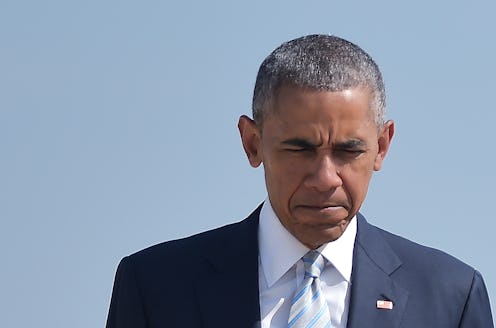On Thursday afternoon, President Barack Obama responded to Alton Sterling and Philando Castile's deaths in a statement posted to Facebook. He began by expressing his condolences, and he assured the public that the Justice Department's civil rights division would be investigating Sterling's death. He wrote:
All Americans should be deeply troubled by the fatal shootings of Alton Sterling in Baton Rouge, Louisiana and Philando Castile in Falcon Heights, Minnesota. We've seen such tragedies far too many times, and our hearts go out to the families and communities who've suffered such a painful loss.
The remainder of Obama's statement was careful and measured, as he was hesitant to place blame on any institution. He insisted that the "vast majority" of police officers are in business to protect the public, yet he acknowledged that racial bias was a deeply rooted problem in American society. Instead of stirring controversy by addressing any officers, he criticized the criminal justice system as a whole and spoke of the challenges it continues to face:
To admit we've got a serious problem in no way contradicts our respect and appreciation for the vast majority of police officers who put their lives on the line to protect us every single day. It is to say that, as a nation, we can and must do better to institute the best practices that reduce the appearance or reality of racial bias in law enforcement.
It's clear that during this heated moment in history, Obama's statement is an attempt at cooling off America. But how can Americans remain cool when people are dying systematically? Instead of suggesting ways the nation can solve this problem, Obama referred back to the Task Force on 21st Century Policing program he implemented two years ago. Given the recent shootings, as well as the numerous unarmed black men shot by police officers over the past two years, it's difficult to have faith in that program.
On one hand, Obama's efforts to avoid controversy are understandable, because he's expected to be the nation's rock. Instead of breaking people into factions or attributing a political spin to Sterling's and Castile's deaths, he's trying to inspire people to unite. He ended his statement this way:
In the meantime, all Americans should recognize the anger, frustration, and grief that so many Americans are feeling -- feelings that are being expressed in peaceful protests and vigils. Michelle and I share those feelings. Rather than fall into a predictable pattern of division and political posturing, let's reflect on what we can do better. Let's come together as a nation, and keep faith with one another, in order to ensure a future where all of our children know that their lives matter.
In the past, the president has attempted to soften the approach of activist movements such as Black Lives Matter. Though there's reason to be angry, he told young people at a London town hall discussion in April that diplomacy is the most effective route. This mindset seems to have dictated his most recent statement.
